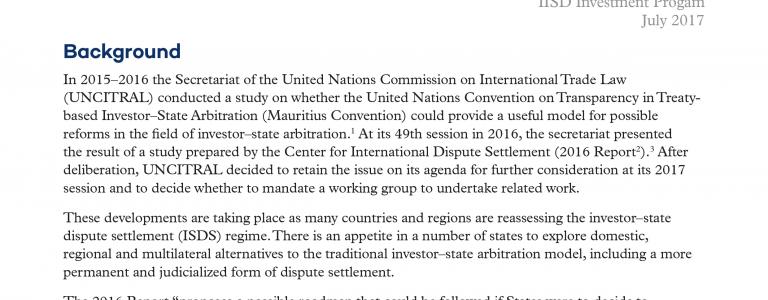United Nations Commission on International Trade Law (UNCITRAL), Fiftieth Session, Vienna, July 3-21, 2017: Submission by IISD regarding the reform of investment-related dispute settlement
IISD's participation in the multilateral process in UNCITRAL is aimed at promoting the much-needed development of a comprehensive and inclusive investment-related dispute settlement mechanism.
In 2015–2016 the Secretariat of the United Nations Commission on International Trade Law (UNCITRAL) conducted a study on whether the United Nations Convention on Transparency in Treaty-based Investor–State Arbitration (Mauritius Convention) could provide a useful model for possible reforms in the field of investor–state arbitration.
The secretariat presented the result of a study prepared by the Geneva Centre for International Dispute Settlement (the CIDS Report). After discussions, UNCITRAL decided to retain the issue on its agenda for further consideration at its 2017 session and to decide whether to mandate a working group to undertake related work.
These developments are taking place as many countries and regions are reassessing the investor–state dispute settlement (ISDS) regime. There is an appetite in a number of states to explore domestic, regional and multilateral alternatives to the traditional investor–state arbitration model, including a more permanent and judicialized form of dispute settlement.
IISD supports in principle initiating a discussion on reforming the ISDS regime and building a new mechanism for resolving investment-related disputes. There is a need for an alternative to the traditional arbitration model in the form of a more structured and permanent dispute settlement process—one that is better adapted to investment disputes that involve public policy issues and a range of different stakeholders and interests. Our participation in the multilateral process in UNCITRAL is aimed at promoting the much-needed development of a comprehensive and inclusive investment-related dispute settlement mechanism.
You might also be interested in
What Drives Investment Policy-makers in Developing Countries to Use Tax Incentives?
The article explores the reasons behind the use of tax incentives in developing countries to attract investment, examining the pressures, challenges, and alternative strategies that exist.
Brussels push to ban ECT disputes gains traction
Two arbitration victories for Spain under the Energy Charter Treaty (ECT) have sparked hopes that efforts to halt the intra-EU disputes that dominate claims under the controversial global pact are starting to bear fruit. Climate scholars, like IISD's Lukas Schaugg, believe the tribunal wins this month signal growing acceptance in international legal circles that EU investors cannot bring ECT claims against other member state governments.
Sustainability rules to impact global trade
Developed countries should consult developing countries in crafting global sustainability rules to prepare these markets for the impact of stringent regulations that may hamper global trade, a United Nations official said at IISD's recent Investment Policy Forum.
Geopolitical risks sparking race for natural resources
Countries within Asia, Latin America, among others, should strengthen their investment policies as ongoing geopolitical risks are resulting in a "fierce" competition in the area of trade and access to natural resources such as nickel and lithium deposits, which play a crucial role in energy transition, according to IISD.
